 Tìm kiếm
Tìm kiếm
Chương VI Luật tổ chức Toà án nhân dân 2014: Toà án quân sự
| Số hiệu: | 62/2014/QH13 | Loại văn bản: | Luật |
| Nơi ban hành: | Quốc hội | Người ký: | Nguyễn Sinh Hùng |
| Ngày ban hành: | 24/11/2014 | Ngày hiệu lực: | 01/06/2015 |
| Ngày công báo: | 29/12/2014 | Số công báo: | Từ số 1167 đến số 1168 |
| Lĩnh vực: | Bộ máy hành chính | Tình trạng: | Còn hiệu lực |
TÓM TẮT VĂN BẢN
Sẽ có thêm Tòa án nhân dân cấp cao
Từ 01/06/2015, hệ thống tổ chức Tòa án nhân dân (TAND) sẽ có thêm TAND cấp cao, đây là điểm mới nổi bật trong Luật tổ chức TAND 2014.
Ngoài ra, còn có nhiều điểm mới khác, như là:
- Đưa vào Luật nội dung Thư ký Tòa án gồm các ngạch: thư ký viên, thư ký viên chính, thư ký viên cao cấp;
- Tương tự, Thẩm tra viên cũng được phân thành ba ngạch: thẩm tra viên, thẩm tra viên chính, thẩm tra viên cao cấp;
- Nhiệm kỳ đầu của thẩm phán là 05 năm; trường hợp được bổ nhiệm lại hoặc bổ nhiệm vào ngạch thẩm phán khác thì nhiệm kỳ tiếp theo là 10 năm;
- Ngạch thẩm phán gồm: Thẩm phán TAND tối cao, thẩm phán cao cấp, thẩm phán trung cấp, thẩm phán sơ cấp.
Luật này thay thế Luật tổ chức TAND 2002.
Văn bản tiếng việt
Văn bản tiếng anh
Các Tòa án quân sự được tổ chức trong Quân đội nhân dân Việt Nam để xét xử những vụ án mà bị cáo là quân nhân tại ngũ và những vụ án khác theo quy định của luật.
1. Tòa án quân sự trung ương.
2. Tòa án quân sự quân khu và tương đương.
3. Tòa án quân sự khu vực.
1. Tòa án quân sự trung ương có nhiệm vụ, quyền hạn sau đây:
a) Phúc thẩm vụ việc mà bản án, quyết định sơ thẩm của Tòa án quân sự quân khu và tương đương chưa có hiệu lực pháp luật bị kháng cáo, kháng nghị theo quy định của Bộ luật tố tụng hình sự;
b) Giám đốc thẩm, tái thẩm bản án, quyết định đã có hiệu lực pháp luật của Tòa án quân sự quân khu và tương đương, Tòa án quân sự khu vực bị kháng nghị theo quy định của Bộ luật tố tụng hình sự.
2. Cơ cấu tổ chức của Tòa án quân sự trung ương gồm:
a) Ủy ban Thẩm phán Tòa án quân sự trung ương;
b) Tòa phúc thẩm Tòa án quân sự trung ương;
c) Bộ máy giúp việc.
3. Tòa án quân sự trung ương có Chánh án, các Phó Chánh án, Chánh tòa, các Phó Chánh tòa, Thẩm phán, Thẩm tra viên, Thư ký Tòa án, công chức và người lao động.
4. Chánh án Tòa án nhân dân tối cao quyết định thành lập và quy định nhiệm vụ, quyền hạn của bộ máy giúp việc trong Tòa án quân sự trung ương sau khi thống nhất với Bộ trưởng Bộ Quốc phòng.
1. Ủy ban Thẩm phán Tòa án quân sự trung ương bao gồm Chánh án, Phó Chánh án là Thẩm phán cao cấp và một số Thẩm phán cao cấp do Chánh án Tòa án nhân dân tối cao quyết định theo đề nghị của Chánh án Tòa án quân sự trung ương.
Tổng số thành viên Ủy ban Thẩm phán Tòa án quân sự trung ương không quá 07 người.
2. Ủy ban Thẩm phán Tòa án quân sự trung ương có nhiệm vụ, quyền hạn sau đây:
a) Giám đốc thẩm, tái thẩm bản án, quyết định đã có hiệu lực pháp luật của Tòa án quân sự quân khu và tương đương, Tòa án quân sự khu vực bị kháng nghị theo quy định của Bộ luật tố tụng hình sự;
b) Thảo luận, góp ý kiến đối với báo cáo của Chánh án Tòa án quân sự trung ương về công tác của các Tòa án quân sự để báo cáo với Chánh án Tòa án nhân dân tối cao và Bộ trưởng Bộ Quốc phòng.
3. Phiên họp của Ủy ban Thẩm phán Tòa án quân sự trung ương phải có ít nhất hai phần ba tổng số thành viên tham gia; quyết định của Ủy ban Thẩm phán Tòa án quân sự trung ương phải được quá nửa tổng số thành viên biểu quyết tán thành.
Ủy ban Thẩm phán Tòa án quân sự trung ương tổ chức xét xử theo quy định tại Điều 32 của Luật này.
1. Phúc thẩm vụ việc mà bản án, quyết định sơ thẩm của Tòa án quân sự quân khu và tương đương chưa có hiệu lực pháp luật bị kháng cáo, kháng nghị theo quy định của Bộ luật tố tụng hình sự.
2. Thực hiện nhiệm vụ, quyền hạn khác theo quy định của luật.
1. Cơ cấu, tổ chức của Tòa án quân sự quân khu và tương đương gồm:
a) Ủy ban Thẩm phán;
b) Bộ máy giúp việc.
2. Tòa án quân sự quân khu và tương đương có Chánh án, Phó Chánh án, Thẩm phán, Thẩm tra viên, Thư ký Tòa án, công chức khác và người lao động.
3. Chánh án Tòa án nhân dân tối cao quyết định thành lập và quy định nhiệm vụ, quyền hạn của bộ máy giúp việc trong Tòa án quân sự quân khu và tương đương sau khi thống nhất với Bộ trưởng Bộ Quốc phòng.
1. Sơ thẩm vụ án theo quy định của Bộ luật tố tụng hình sự.
2. Phúc thẩm vụ án hình sự mà bản án, quyết định sơ thẩm của Tòa án quân sự khu vực chưa có hiệu lực pháp luật bị kháng cáo, kháng nghị theo quy định của Bộ luật tố tụng hình sự.
3. Thực hiện nhiệm vụ, quyền hạn khác theo quy định của luật.
1. Ủy ban Thẩm phán Tòa án quân sự quân khu và tương đương gồm Chánh án, Phó Chánh án và một số Thẩm phán. Số lượng thành viên của Ủy ban Thẩm phán do Chánh án Tòa án nhân dân tối cao quyết định theo đề nghị của Chánh án Tòa án quân sự quân khu và tương đương.
Phiên họp Ủy ban Thẩm phán Tòa án quân sự quân khu và tương đương do Chánh án chủ trì.
2. Ủy ban Thẩm phán Tòa án quân sự quân khu và tương đương có nhiệm vụ, quyền hạn:
a) Thảo luận về việc thực hiện chương trình, kế hoạch công tác của Tòa án quân sự quân khu và tương đương;
b) Thảo luận báo cáo công tác của Chánh án Tòa án quân sự quân khu và tương đương với Tòa án nhân dân tối cao và Bộ Quốc phòng;
c) Tổng kết kinh nghiệm xét xử;
d) Thảo luận về kiến nghị của Chánh án Tòa án quân sự quân khu và tương đương đề nghị Chánh án Tòa án quân sự trung ương xem xét lại bản án, quyết định đã có hiệu lực pháp luật theo thủ tục giám đốc thẩm, tái thẩm theo yêu cầu của Chánh án.
1. Tòa án quân sự khu vực có nhiệm vụ, quyền hạn sau đây:
a) Sơ thẩm vụ án theo quy định của Bộ luật tố tụng hình sự;
b) Thực hiện nhiệm vụ, quyền hạn khác theo quy định của luật.
2. Tòa án quân sự khu vực có Chánh án, Phó Chánh án, Thẩm phán, Thư ký Tòa án, công chức khác và người lao động.
3. Chánh án Tòa án nhân dân tối cao quyết định thành lập và quy định nhiệm vụ, quyền hạn của bộ máy giúp việc trong Tòa án quân sự khu vực sau khi thống nhất với Bộ trưởng Bộ Quốc phòng.
1. Chánh án Tòa án quân sự trung ương là Phó Chánh án Tòa án nhân dân tối cao do Chủ tịch nước bổ nhiệm, miễn nhiệm, cách chức.
Nhiệm kỳ của Chánh án Tòa án quân sự trung ương là 05 năm, kể từ ngày được bổ nhiệm.
2. Chánh án Tòa án quân sự trung ương có nhiệm vụ, quyền hạn sau đây:
a) Tổ chức công tác xét xử của Tòa án quân sự trung ương; chịu trách nhiệm tổ chức thực hiện nguyên tắc Thẩm phán, Hội thẩm xét xử độc lập và chỉ tuân theo pháp luật;
b) Chủ tọa phiên họp của Ủy ban Thẩm phán Tòa án quân sự trung ương;
c) Kháng nghị theo thủ tục giám đốc thẩm bản án, quyết định đã có hiệu lực pháp luật của Tòa án quân sự quân khu và tương đương, Tòa án quân sự khu vực theo quy định của Bộ luật tố tụng hình sự;
d) Tổ chức việc kiểm tra công tác của các Tòa án quân sự quân khu và tương đương, Tòa án quân sự khu vực;
đ) Tổ chức bồi dưỡng nghiệp vụ cho Thẩm phán, Hội thẩm quân nhân, Thẩm tra viên, Thư ký Tòa án của các Tòa án quân sự;
e) Báo cáo công tác của Tòa án quân sự với Chánh án Tòa án nhân dân tối cao và Bộ trưởng Bộ Quốc phòng;
g) Bổ nhiệm, miễn nhiệm, cách chức các chức vụ trong các Tòa án quân sự, trừ Thẩm phán, Chánh án, Phó Chánh án;
h) Thực hiện nhiệm vụ, quyền hạn theo quy định của Bộ luật tố tụng hình sự; giải quyết các việc khác theo quy định của pháp luật.
1. Phó Chánh án Tòa án quân sự trung ương do Chánh án Tòa án nhân dân tối cao bổ nhiệm, miễn nhiệm, cách chức sau khi thống nhất với Bộ trưởng Bộ Quốc phòng.
Nhiệm kỳ của Phó Chánh án Tòa án quân sự trung ương là 05 năm, kể từ ngày được bổ nhiệm.
2. Phó Chánh án Tòa án quân sự trung ương giúp Chánh án thực hiện nhiệm vụ theo sự phân công của Chánh án. Khi Chánh án vắng mặt, một Phó Chánh án được Chánh án ủy nhiệm lãnh đạo công tác của Tòa án. Phó Chánh án chịu trách nhiệm trước Chánh án về nhiệm vụ được giao.
3. Thực hiện nhiệm vụ, quyền hạn theo quy định của Bộ luật tố tụng hình sự.
1. Chánh án Tòa án quân sự quân khu và tương đương do Chánh án Tòa án nhân dân tối cao bổ nhiệm, miễn nhiệm, cách chức sau khi thống nhất với Bộ trưởng Bộ Quốc phòng.
Nhiệm kỳ của Chánh án Tòa án quân sự quân khu và tương đương là 05 năm, kể từ ngày được bổ nhiệm.
2. Chánh án Tòa án quân sự quân khu và tương đương có nhiệm vụ, quyền hạn sau đây:
a) Tổ chức công tác xét xử của Tòa án quân sự quân khu và tương đương; chịu trách nhiệm tổ chức thực hiện nguyên tắc Thẩm phán, Hội thẩm xét xử độc lập và chỉ tuân theo pháp luật;
b) Báo cáo công tác của Tòa án quân sự quân khu và tương đương, Tòa án quân sự khu vực với Chánh án Tòa án quân sự trung ương và Tư lệnh quân khu và tương đương;
c) Thực hiện nhiệm vụ, quyền hạn theo quy định của Bộ luật tố tụng hình sự; giải quyết các việc khác theo quy định của pháp luật.
1. Phó Chánh án Tòa án quân sự quân khu và tương đương do Chánh án Tòa án nhân dân tối cao bổ nhiệm, miễn nhiệm, cách chức sau khi thống nhất với Bộ trưởng Bộ Quốc phòng.
Nhiệm kỳ của Phó Chánh án Tòa án quân sự quân khu và tương đương là 05 năm, kể từ ngày được bổ nhiệm.
2. Phó Chánh án Tòa án quân sự quân khu và tương đương giúp Chánh án thực hiện nhiệm vụ theo sự phân công của Chánh án. Khi Chánh án vắng mặt, một Phó Chánh án được Chánh án ủy nhiệm lãnh đạo công tác của Tòa án. Phó Chánh án chịu trách nhiệm trước Chánh án về nhiệm vụ được giao.
3. Thực hiện nhiệm vụ, quyền hạn theo quy định của Bộ luật tố tụng hình sự.
1. Chánh án Tòa án quân sự khu vực do Chánh án Tòa án nhân dân tối cao bổ nhiệm, miễn nhiệm, cách chức sau khi thống nhất với Bộ trưởng Bộ Quốc phòng.
Nhiệm kỳ của Chánh án Tòa án quân sự khu vực là 05 năm, kể từ ngày được bổ nhiệm.
2. Chánh án Tòa án quân sự khu vực có nhiệm vụ, quyền hạn sau đây:
a) Tổ chức công tác xét xử của Tòa án quân sự khu vực; chịu trách nhiệm tổ chức thực hiện nguyên tắc Thẩm phán, Hội thẩm xét xử độc lập và chỉ tuân theo pháp luật;
b) Báo cáo công tác của Tòa án quân sự khu vực với Chánh án Tòa án quân sự quân khu và tương đương;
c) Thực hiện nhiệm vụ, quyền hạn theo quy định của Bộ luật tố tụng hình sự; giải quyết các việc khác theo quy định của pháp luật.
1. Phó Chánh án Tòa án quân sự khu vực do Chánh án Tòa án nhân dân tối cao bổ nhiệm, miễn nhiệm, cách chức sau khi thống nhất với Bộ trưởng Bộ Quốc phòng.
Nhiệm kỳ của Phó Chánh án Tòa án quân sự khu vực là 05 năm, kể từ ngày được bổ nhiệm.
2. Phó Chánh án Tòa án quân sự khu vực giúp Chánh án thực hiện nhiệm vụ theo sự phân công của Chánh án. Khi Chánh án vắng mặt, một Phó Chánh án được Chánh án ủy nhiệm lãnh đạo công tác của Tòa án. Phó Chánh án chịu trách nhiệm trước Chánh án về nhiệm vụ được giao.
3. Thực hiện nhiệm vụ, quyền hạn theo quy định của Bộ luật tố tụng hình sự.
Chapter VI
MILITARY COURTS
Section 1. DUTIES, POWERS AND ORGANIZATIONAL STRUCTURE OF MILITARY COURTS
Article 49. Duties and powers of military courts
Military courts shall be organized in the Vietnam People’s Army to try cases involving defendants who are in-service army men and other cases prescribed by law.
Article 50. Organization of military courts
1. The Central Military Court;
2. Military courts of military zones and the equivalent;
3. Regional military courts.
Article 51. Duties, powers and organizational structure of the Central Military Court
1. The Central Military Court has the following duties and powers:
a/ To conduct appellate trials of cases in which first-instance judgments or decisions of military courts of military zones which have not yet taken legal effect are appealed or protested against in accordance with the Criminal Procedure Code;
b/ To conduct according to cassation or reopening procedure trials of cases in which legally effective judgments or decisions of military courts of military zones or the equivalent or of regional military courts are protested against in accordance with the Criminal Procedure Code.
2. The organizational structure of the Central Military Court consists of:
a/ The Judicial Committee;
b/ The Appellate Court;
c/ The assisting apparatus.
3. The Central Military Court has its Chief Justice, Deputy Chief Justices, the president and vice presidents of the Appellate Court, judges, examiners, court clerks, civil servants and employees.
4. The Chief Justice of the Supreme People’s Court shall decide on the establishment and stipulate duties and powers of the assisting apparatus of the Central Military Court after reaching agreement with the Minister of National Defense.
Article 52. The Judicial Committee of the Central Military Court
1. The Judicial Committee of the Central Military Court shall be composed of the Chief Justice, Deputy Chief Justices being high-level judges and a number of high-level judges of the Central Military Court decided by the Chief Justice of the Supreme People’s Court at the proposal of the Chief Justice of the Central Military Court.
The total number of members of the Judicial Committee of the Central Military Court must not exceed 7.
2. The Judicial Committee of the Central Military Court has the following duties and powers:
a/ To conduct according to cassation or reopening procedure trials of cases in which legally effective judgments or decisions of military courts of military zones or the equivalent or of regional military courts are protested against in accordance with the Criminal Procedure Code;
b/ To discuss and give opinions on reports of the Chief Justice of the Central Military Court on work of military courts before reporting it to the Chief Justice of the Supreme People’s Court and the Minister of National Defense.
3. A meeting of the Judicial Committee of the Central Military Court shall be attended by at least two thirds of its total members; a decision of the Judicial Committee of the Central Military Court shall be voted for by more than half of its total members.
Article 53. Organization of trial by the Judicial Committee of the Central Military Court
The Judicial Committee of the Central Military Court shall organize trial under Article 32 of this Law.
Article 54. Duties and powers of the Appellate Court of the Central Military Court
1. To conduct appellate trials of cases in which first-instance judgments or decisions of military courts of military zones or the equivalent which have not yet taken legal effect are appealed or protested against in accordance with the Criminal Procedure Code.
2. To perform other duties and exercise other powers prescribed by law.
Article 55. Organizational structure of military courts of military zones and the equivalent
1. The organizational structure of a military court of a military zone or the equivalent consists of:
a/ The judicial committee;
b/ The assisting apparatus.
2. A military court of a military zone or the equivalent has its chief justice, deputy chief justices, judges, examiners, court clerks, other civil servants and employees.
3. The Chief Justice of the Supreme People’s Court shall decide on the establishment and stipulate duties and powers of the assisting apparatus of military courts of military zones and the equivalent after reaching agreement with the Minister of National Defense.
Article 56. Duties and powers of military courts of military zones and the equivalent
1. To conduct first-instance trials of cases prescribed by the Criminal Procedure Code.
2. To conduct appellate trials of criminal cases in which first-instance judgments or decisions of regional military courts which have not yet taken effect are appealed or protested against in accordance with the Criminal Procedure Code.
3. To perform other duties and exercise other powers prescribed by law.
Article 57. Judicial committees of military courts of military zones and the equivalent
1. The judicial committee of a military court of a military zone or the equivalent shall be composed of the chief justice, deputy chief justices and a number of judges. The number of member of the judicial committee shall be decided by the Chief Justice of the Supreme People’s Court at the proposal of the chief justice of the military court.
Meetings of the judicial committee of a military court of a military zone or the equivalent shall be chaired by the chief justice.
2. The judicial committee of a military court of a military zone or the equivalent has the following duties and powers:
a/ To discuss the implementation of work programs and plans of its military court;
b/ To discuss work reports of the chief justice of its military court to the Supreme People’s Court and the Ministry of National Defense;
c/ To summarize adjudication experience;
d/ To discuss recommendations of the chief justice of its military court for the Chief Justice of the Central Military Court to review legally effective judgments and decisions according to cassation or reopening procedure.
Article 58. Duties, powers and organizational structures of regional military courts
1. A regional military court has the following duties and powers:
a/ To conduct first-instance trials of cases prescribed by the Criminal Procedure Code;
b/ To perform other duties and exercise other powers prescribed by law.
2. A regional military court has its chief justice, deputy chief justices, judges, court clerks, other civil servants and employees.
3. The Chief Justice of the Supreme People’s Court shall decide on the establishment and stipulate duties and powers of the assisting apparatus of regional military courts after reaching agreement with the Minister of National Defense.
Section 2. CHIEF JUSTICES AND DEPUTY CHIEF JUSTICES OF MILITARY COURTS
Article 59. The Chief Justice of the Central Military Court
1. The Chief Justice of the Central Military Court is a Deputy Chief Justice of the Supreme People’s Court who shall be appointed, relieved from duty or dismissed by the President.
The term of office of the Chief Justice of the Central Military Court is 5 years from the date of appointment.
2. The Chief Justice of the Central Military Court has the following duties and powers:
a/ To organize the adjudicating work of the Central Military Court; to organize the implementation of the principle that judges and assessors shall conduct trials in an independent manner and obey only the law;
b/ To chair meetings of the Judicial Committee of the Central Military Court;
c/ To make protests according to cassation procedure against legally effective judgments or decisions of military courts of military zones and the equivalent and of regional military courts in accordance with the Criminal Procedure Code;
d / To organize inspection of work of military courts of military zones and the equivalent and of regional military courts;
dd/ To organize professional training courses for judges, army men’s assessors, examiners and court clerks of military courts;
e/ To report on military courts’ work to the Chief Justice of the Supreme People’s Court and the Minister of National Defense;
g/ To appoint, relieve from duty or dismiss position holders in military courts, except judges, chief justices and deputy chief justices;
h/ To perform the duties and exercise the powers prescribed by the Criminal Procedure Code; and to settle other matters in accordance with law.
Article 60. Deputy Chief Justices of the Central Military Court
1. Deputy Chief Justices of the Central Military Court shall be appointed, relieved from duty or dismissed by the Chief Justice of the Supreme People’s Court after reaching agreement with the Minister of National Defense.
The term of office of Deputy Chief Justices of the Central Military Court is 5 years from the date of appointment.
2. Deputy Chief Justices of the Central Military Court shall assist the Chief Justice in performing his/her duties as assigned by the latter. When the Chief Justice is absent, a Deputy Chief Justice authorized by the Chief Justice shall lead the work of the Court. The authorized Deputy Chief Justice shall be answerable to the Chief Justice for the assigned tasks.
3. To perform the duties and exercise the powers prescribed by the Criminal Procedural Code.
Article 61. Chief justices of military courts of military zones and the equivalent
1. Chief justices of military courts of military zones and the equivalent shall be appointed, relieved from duty or dismissed by the Chief Justice of the Supreme People’s Court after reaching agreement with the Minister of National Defense.
The term of office of chief justices of military courts of military zones and the equivalent is 5 years from the date of appointment.
2. The chief justice of a military court of a military zone or the equivalent has the following duties and powers:
a/ To organize the adjudicating work of his/her military court; to organize the implementation of the principle that judges and assessors shall conduct trials in an independent manner and obey only the law;
b/ To report on work of his/her military court and regional military courts to the Chief Justice of the Central Military Court and the commander of the military zone or the equivalent;
c/ To perform the duties and exercise the powers prescribed by the Criminal Procedural Code; and to settle other matters prescribed by law.
Article 62. Deputy chief justices of military courts of military zones and the equivalent
1. Deputy chief justices of a military court of a military zone or the equivalent shall be appointed, relieved from duty or dismissed by the Chief Justice of the Supreme People’s Court after reaching agreement with the Minister of National Defense.
The term of office of deputy chief justices of military courts of military zones and the equivalent is 5 years from the date of appointment.
2. Deputy chief justices of a military court of a military zone or the equivalent shall assist their chief justice in performing his/her duties as assigned by the latter. When the chief justice is absent, a deputy chief justice authorized by the chief justice shall lead the work of the court. The authorized deputy chief justice shall be answerable to the chief justice for the assigned tasks.
3. Deputy chief justices of a military court of a military zone or the equivalent shall perform the duties and exercise the powers prescribed by the Criminal Procedure Code.
Article 63. Chief justices of regional military courts
1. Chief justices of regional military courts shall be appointed, relieved from duty or dismissed by the Chief Justice of the Supreme People’s Court after reaching agreement with the Minister of National Defense.
The term of office of chief justices of regional military courts is 5 years from the date of appointment.
2. The chief justice of a regional military court has the following duties and powers:
a/ To organize the adjudicating work of his/her court; to organize the implementation of the principle that judges and assessors shall conduct trials in an independent manner and obey only the law;
b/ To report on work of his/her court to the chief justice of the military court of the military zone or the equivalent;
c/ To perform the duties and exercise the powers prescribed by the Criminal Procedural Code; and to settle other matters prescribed by law.
Article 64. Deputy chief justices of regional military courts
1. Deputy chief justices of a regional military court shall be appointed, relieved from duty or dismissed by the Chief Justice of the Supreme People’s Court after reaching agreement with the Minister of National Defense.
The term of office of deputy chief justices of a regional military court is 5 years from the date of appointment.
2. Deputy chief justices of a regional military court shall assist their chief justice in performing his/her duties as assigned by the latter. When the chief justice is absent, a deputy chief justice authorized by the chief justice shall lead the work of the court. The authorized deputy chief justice must be answerable to chief justice for the assigned tasks.
3. To perform the duties and exercise the powers prescribed by the Criminal Procedural Code.
Văn bản liên quan
Cập nhật
Bài viết liên quan
Cơ cấu, nhiệm vụ Ủy ban kiểm tra quân ủy trung ương mới nhất 2025
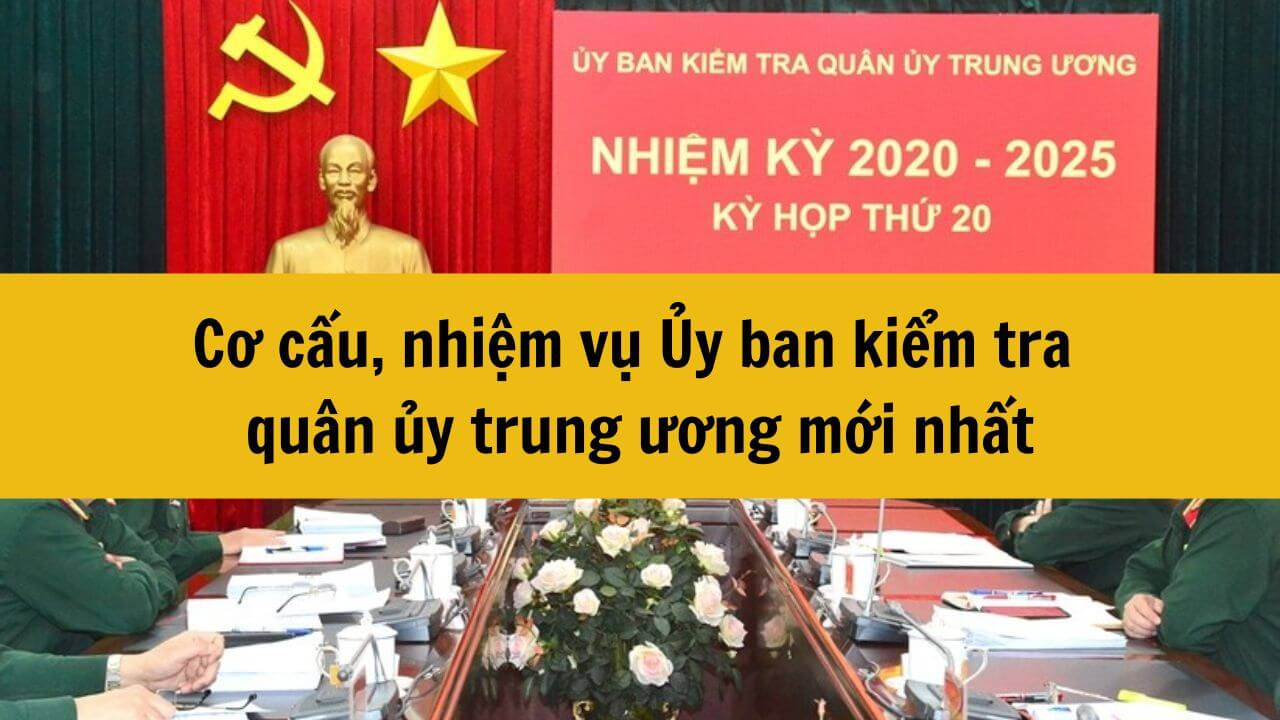
Cơ cấu, nhiệm vụ Ủy ban kiểm tra quân ủy trung ương mới nhất 2025
Ủy ban Kiểm tra Quân ủy Trung ương đóng vai trò quan trọng trong việc bảo đảm kỷ luật, kiểm soát và nâng cao hiệu quả hoạt động của lực lượng vũ trang nhân dân Việt Nam. Năm 2025, trong bối cảnh đất nước đối mặt với nhiều thách thức mới, cơ cấu và nhiệm vụ của Ủy ban này càng trở nên cần thiết và cấp bách hơn bao giờ hết. Vậy hiện nay, pháp luật quy định ra sao về cơ cấu, nhiệm vụ Ủy ban kiểm tra quân ủy trung ương? 21/11/2024Nhiệm vụ, quyền hạn Cục Điều tra hình sự Quân đội nhân dân Việt Nam mới nhất 2025

Nhiệm vụ, quyền hạn Cục Điều tra hình sự Quân đội nhân dân Việt Nam mới nhất 2025
Trong bối cảnh an ninh quốc gia và trật tự xã hội ngày càng phức tạp, Cục Điều tra hình sự Quân đội nhân dân Việt Nam đóng vai trò quan trọng trong việc bảo vệ và thực thi pháp luật. Bài viết này sẽ đi sâu vào các nhiệm vụ và quyền hạn của Cục Điều tra hình sự theo quy định pháp luật hiện hành, từ đó làm rõ vai trò của đơn vị trong việc bảo vệ tổ quốc và xây dựng một lực lượng vũ trang tinh nhuệ, hiệu quả. 21/11/2024Cơ cấu tổ chức, nhiệm vụ quyền hạn Viện kiểm sát quân sự trung ương mới nhất 2025

Cơ cấu tổ chức, nhiệm vụ quyền hạn Viện kiểm sát quân sự trung ương mới nhất 2025
Trong bối cảnh quốc phòng và an ninh ngày càng được chú trọng, vai trò của Viện kiểm sát quân sự Trung ương trở nên ngày càng quan trọng trong việc bảo đảm sự tuân thủ pháp luật và bảo vệ quyền lợi của nhà nước, tổ chức và cá nhân. Năm 2025, quy định về cơ cấu tổ chức, nhiệm vụ và quyền hạn của Viện kiểm sát quân sự Trung ương đã và đang ngày càng được hoàn thiện, nhằm đáp ứng yêu cầu nhiệm vụ trong tình hình mới. 21/11/2024Cơ cấu tổ chức, nhiệm vụ quyền hạn Tòa án quân sự khu vực mới nhất 2025
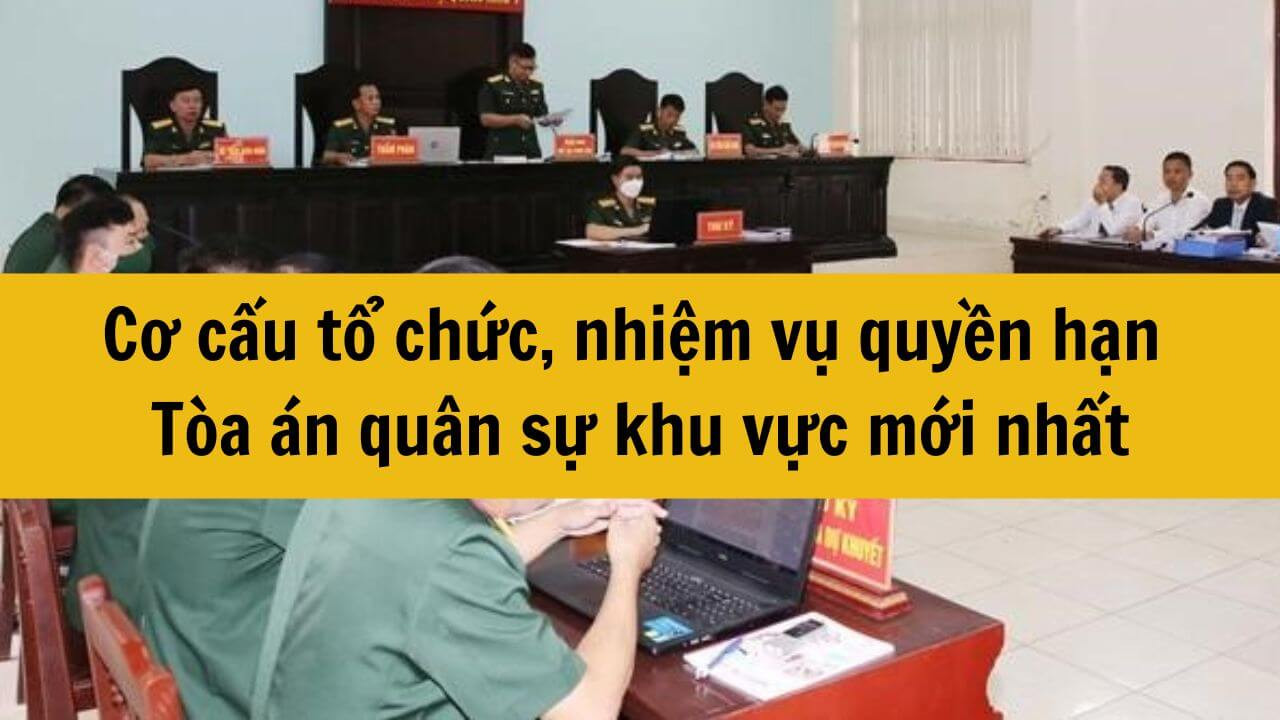
Cơ cấu tổ chức, nhiệm vụ quyền hạn Tòa án quân sự khu vực mới nhất 2025
Năm 2025 các quy định mới nhất về Tòa án quân sự nói chung và Tòa án quân sự khu vực nói riêng đã và đang ngày càng được hoàn thiện nhằm nâng cao hiệu quả hoạt động và đảm bảo quyền lợi chính đáng cho các quân nhân cũng như cán bộ, chiến sĩ. Vậy hiện nay, nhiệm vụ, quyền hạn, cơ cấu tổ chức của Tòa án quân sự khu vực được quy định ra sao? 21/11/2024Cơ cấu tổ chức, nhiệm vụ quyền hạn Tòa án quân sự quân khu mới nhất 2025
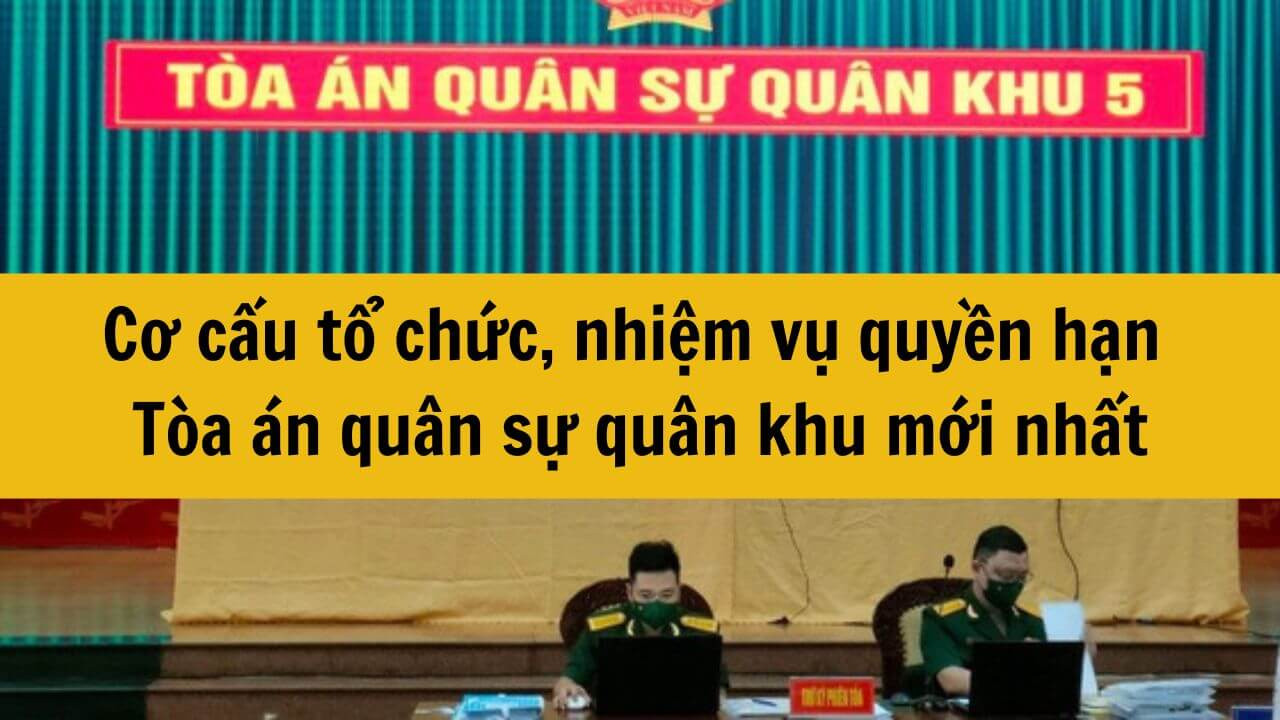
Cơ cấu tổ chức, nhiệm vụ quyền hạn Tòa án quân sự quân khu mới nhất 2025
Trong bối cảnh hiện nay, việc cải cách hệ thống tư pháp quân sự đóng vai trò quan trọng trong việc bảo vệ pháp luật và trật tự xã hội. Hiện nay, bộ máy Tòa án quân sự đang ngày càng được hoàn thiện, trong đó Tòa án quân sự quân khu đóng vai trò quan trọng. Hiện nay pháp luật quy định ra sao về nhiệm vụ, hoạt động, cơ cấu tổ chức của Tòa án quân sự quân khu? 21/11/2024Cơ cấu tổ chức, nhiệm vụ quyền hạn Tòa án quân sự trung ương mới nhất 2025
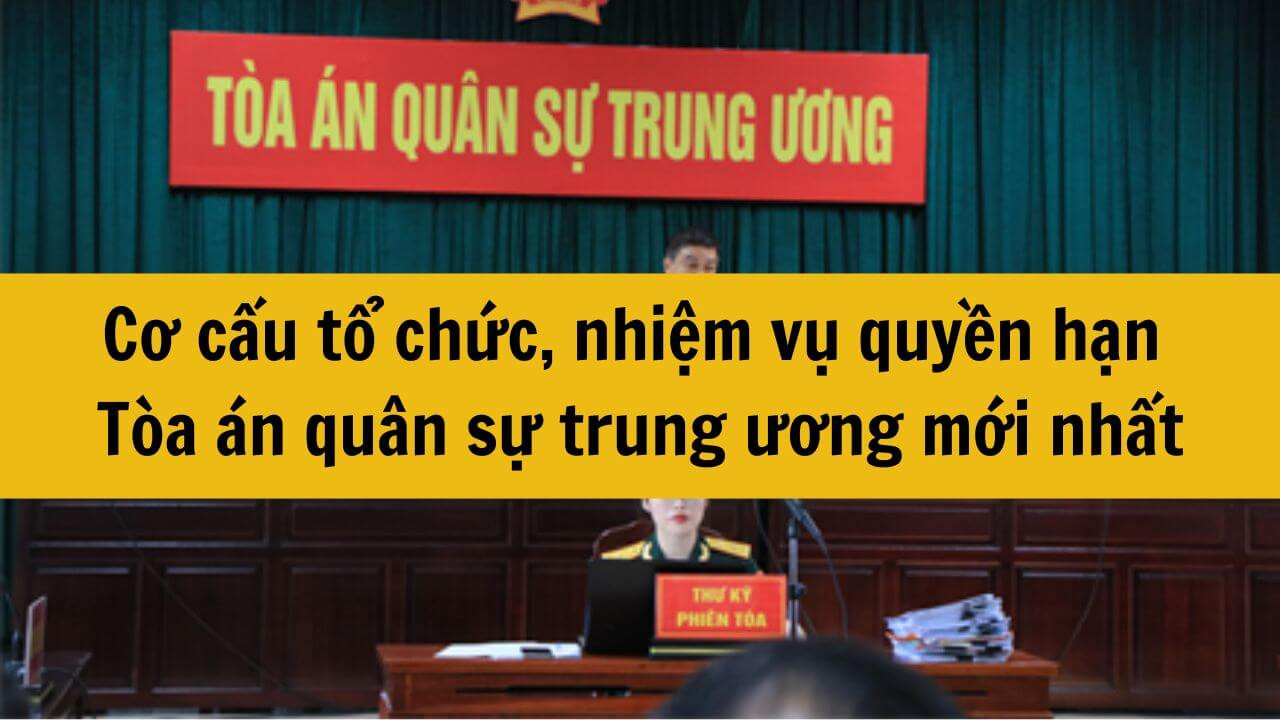
Cơ cấu tổ chức, nhiệm vụ quyền hạn Tòa án quân sự trung ương mới nhất 2025
Trong bối cảnh an ninh quốc gia ngày càng trở nên phức tạp, việc cải cách hệ thống tư pháp quân sự đóng vai trò quan trọng trong việc bảo vệ pháp luật và trật tự xã hội. Hiện nay, bộ máy Tòa án quân sự đang ngày càng được hoàn thiện, trong đó đứng đầu là Tòa án quân sự trung ương. Vậy hiện nay pháp luật quy định ra sao về nhiệm vụ, hoạt động, cơ cấu tổ chức của Tòa án quân sự trung ương? 21/11/2024Quy định mới nhất 2025 về Tòa án quân sự
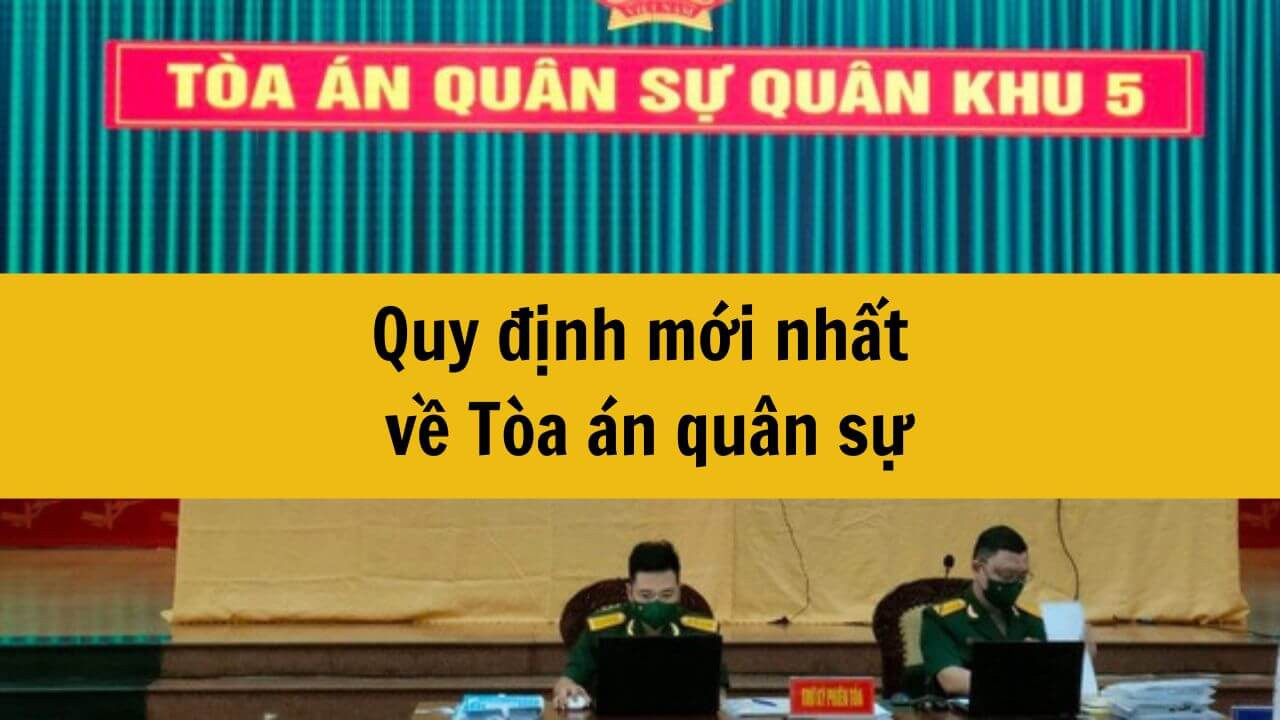
Quy định mới nhất 2025 về Tòa án quân sự
Trong bối cảnh an ninh quốc gia ngày càng trở nên phức tạp, việc cải cách hệ thống tư pháp quân sự đóng vai trò quan trọng trong việc bảo vệ pháp luật và trật tự xã hội. Năm 2025 các quy định mới nhất về Tòa án quân sự đã và đang ngày càng được hoàn thiện nhằm nâng cao hiệu quả hoạt động và đảm bảo quyền lợi chính đáng cho các quân nhân cũng như cán bộ, chiến sĩ. 21/11/2024Những ngành nghề cần có bằng cử nhân Luật

Những ngành nghề cần có bằng cử nhân Luật
Bằng cử nhân luật mở ra rất nhiều cơ hội nghề nghiệp đa dạng và hấp dẫn. Với kiến thức chuyên sâu về pháp luật, người tốt nghiệp ngành luật có thể lựa chọn làm việc tại nhiều lĩnh vực khác nhau. Dưới đây là một số ngành nghề phổ biến mà bạn có thể tham khảo. 06/11/2024Civil Law là gì? Việt Nam theo hệ thống pháp luật nào? Common Law hay Civil Law?
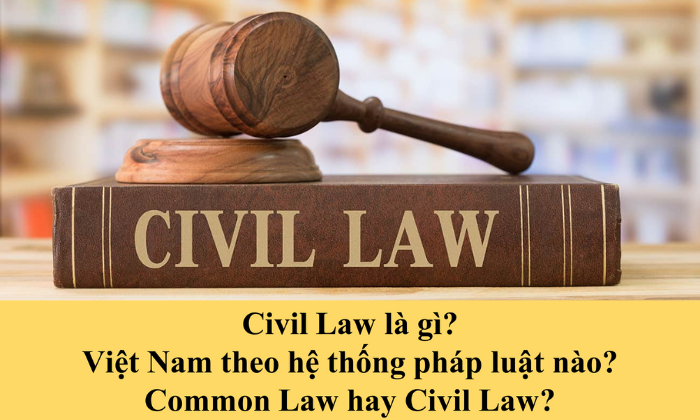
Civil Law là gì? Việt Nam theo hệ thống pháp luật nào? Common Law hay Civil Law?
Civil Law là gì? Việt Nam theo hệ thống pháp luật nào? Common Law hay Civil Law? 04/11/2024Văn bản quy phạm pháp luật là gì?


 Luật tổ chức Toà án nhân dân 2014 (Bản Word)
Luật tổ chức Toà án nhân dân 2014 (Bản Word)
 Luật tổ chức Toà án nhân dân 2014 (Bản Pdf)
Luật tổ chức Toà án nhân dân 2014 (Bản Pdf)